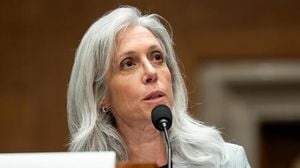Target Corporation's announcement to roll back its diversity, equity, and inclusion (DEI) initiatives has sparked significant backlash, particularly from civil rights activists and local communities. This reversal has triggered calls for boycotts, highlighting feelings of betrayal among supporters who have long backed the retailer's previously progressive stance.
The company's decision, made public on January 24, 2025, marked the end of several DEI goals the retailer had committed to, including its participation in third-party diversity surveys and specific programs aimed at boosting racial equity within its operations. Kiera Fernandez, Target's Chief Community Impact and Equity Officer, noted the changes were made to align with the "evolving external landscapes." Yet what has unfolded is more of fury than alignment.
On February 1, coinciding with the beginning of Black History Month, activists rallied outside Target’s headquarters in Minneapolis, urging supporters to boycott the retailer. "We thought they would continue to stand for the values we all hold dear," Nekima Levy Armstrong, civil rights attorney and activist, lamented. "But instead, they acted cowardly and made the decision to bow down to the Trump administration," referencing the political climate influencing corporate practices.
This reaction echoes the sentiments of many consumers, including local voices such as Deborah Copperud, founder of the Substack newsletter 'Deborah Copperud Shops At Target', who penned her own op-ed denouncing the retail giant. "The reversal of Target’s commitment to supporting social justice advancements hurts," she observed, recalling her history with the brand during the COVID-19 pandemic when the company had been applauded for its response to the social justice movement ignited by George Floyd's murder.
Target's previous reputation as one of the more progressive retailers may have intensified the disappointment. Having historically supported initiatives tied to racial equity and LGBTQ+ rights, its decision to roll back these programs signifies not just operational shifts but also potential detriment to local Black-owned businesses reliant on Target's commitments. Marketers like April Showers, founder of Afro Unicorn, expressed concerns over potential losses. Yet, they also urged their customers to support those Black-owned brands directly through their websites instead of withdrawing from the retailer altogether.
The backlash from the community has brought forward debates about corporate social responsibility. Activists argue for a strategic “buycott,” encouraging consumers to purchase products directly from the businesses Target has partnered with rather than refraining from shopping altogether. This strategy aims to rally support for the affected local enterprises rather than let the boycott negatively impact their economic standing.
Social media has become rife with reactions since Target's announcement, with many users decrying the shift as "selling out" and expressing their intent to shop locally instead. A recent post on Facebook garnered over 1,500 angry reactions following the company's announcement, reflecting the community's anger and disappointment.
On top of activism from the community, civil rights organizations are actively organizing against Target's rollback. Their argument rests not only on the cultural significance of DEI efforts but also on their economic ramifications. Organizations have endorsed the idea of boycotting against corporations failing to uphold commitments made to communities of color.
Activists are not merely critiquing Target; they are framing their protest as part of something bigger - emphasizing the importance of continuing the fight for equity amid growing conservative movements rebuffing DEI initiatives across the nation. The White House's stance under the Trump administration, with executive orders aimed at dismantling DEI efforts, has seemingly emboldened corporations to follow suit, creating discomfort for those who had, until now, seen institutions like Target as allies.
While some companies maintain steadfast commitments to diversity and equity, Target's retreat raises questions about the longevity and sincerity of such commitments across corporate America. Now, Target's actions have turned the retailer from what was once perceived as an ally to one facing intense scrutiny for its decisions.
Beyond the calls for boycott and backlash lies the personal experiences of individuals who felt betrayed by Target’s change. Sheletta Brundidge, another local activist, shared her history with the company, describing the feelings of disappointment and sense of thwarted loyalty many shoppers feel following the announcement. "Actions matter more than promises posted on a company’s website," she remarked about the significance of corporate responsibility.
Despite the upheaval, Target has yet to issue comprehensive responses to the boycott calls or address the concerns being raised by shoppers. The retailer's initial failure to respond may be indicative of its internal struggles to balance community relationships and economic pressures.
Many supporters of the previous DEI initiatives are now advocating for alternative pathways to achieve business growth and mutual support among local minority entrepreneurs, transforming what could be seen as divisive corporate actions back toward the values of inclusion and community support.
For communities grappling with the aftermath of Target's abrupt rollback, the narrative moving forward remains one of resilience and strategic action. With calls for boycotts gaining traction, it has compelled community members to not just react passively, but rather engage actively to support Black-owned businesses as they navigate these changes.



